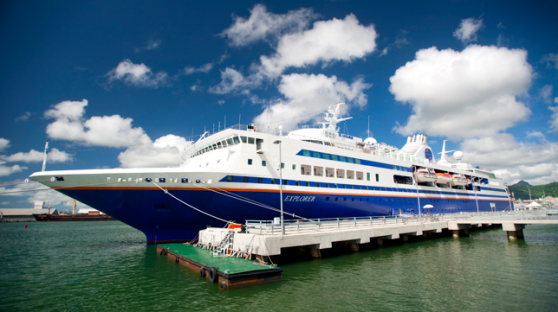Unreasonable at Sea, a floating incubator for tech startups, has selected its first group of companies to expand their business operations while cruising through the high seas.
Invited to join the sailing party are founders, venture capitalists, and students from Semester at Sea, a shipboard program for global study. The ship will call to 14 international ports to learn how to bring their business operations to new markets. At each stop, they’ll pitch their ideas to local politicians, entrepreneurs, and business leaders.
The accelerator describes itself as “mentorship driven” and recently announced its A-list advisors. Y Combinator has nothing on these mentors — there’s even an archbishop to assist entrepreneurs on their spiritual quest. South African activist and Nobel Peace Laureate Desmond Tutu is confirmed to join, alongside Megan Smith (vice president of business development at Google), Matt Mullenweg (founder of WordPress), George Kembel (cofounder of the Stanford d.School), Phil McKinney (VP and CTO at Hewlett-Packard), and other big names.
Unreasonable at Sea is the brainchild of Daniel Epstein, the man behind the Unreasonable Institute, and an alumni of the Semester at Sea program. “From the entrepreneur’s perspective, it’s an opportunity to experiment with products and technology internationally. Startups can take their technology to another market to see what works and walk out with a globally relevant product,” Epstein told VentureBeat in a recent interview.
The voyage is from January 6, 2013 to April 25, 2013. The entrepreneurs will sail across the Pacific and India Oceans, starting in San Diego, and ending their journey in Barcelona. The ship will stop in Hawaii, Japan, China, Hong Kong, Vietnam, and India.
Eleven startups survived the highly competitive application process:
- Aquaphytex installs all-natural plant systems to purify water at scale without any chemicals or energy. It’s currently operating in four countries, providing clean drinking water to over 300,000 people, and made over $4,000,000 in profit in the last three years.
- Artificial Vision for the Blind uses artificial intelligence to help blind people see without surgery or invasive tech. It has developed a pair of glasses that has a camera, a mini-computer, and a transmitter that together, it says, activates the visual cortex of the brain and can enable blind people to see again — and read.
- Damascus Fortune purifies carbon emissions and transforms them into a material to build cars, space ships, buildings, laptops, and mobile phones. It’s a Forbes “30 Under 30” company and recognized by MIT’s Technology Review as part of the “The Top 20 Innovators List.”
- Evolving Technologies produces affordable medical technology and products to bring medical care to areas that are underserved. Its main product is a light, portable edoscopy for woman’s health. It claims the device is over 10 times cheaper than current market alternatives.
- Innoz has 15 million active users across India submitting over half a million inquiries on their mobile SMS platform each day. Innoz is a mobile and wireless company, and it claims it’s transforming the mobile device into a learning tool by giving its users access to the Internet and all its information via SMS.
- Prakti Design is a cookstove developer, designer, and manufacturer and distributor. Ranked as most efficient affordable stove in the world by Berkeley Labs, it has operations currently in five countries. It claims that over 250,000 meals served a day from their stoves.
- Protei makes wind-powered, shape-shifting, open-source sailing robots used to sense and clean the ocean. This autonomous robot could help clean up oil spills and plastic in the ocean as well as collect invaluable data about the environment from the oceans.
- Sasa is a mobile-based e-commerce marketplace that connects offline artisans to global consumers. It claims that it revolutionizes the supply chain into a peer-to-peer exchange and empowers women in Africa to create sustainable micro-enterprises.
- Solar Ear produces affordable hearing aids and solar-powered battery chargers, made by the hearing impaired for the hearing impaired in developing countries. It has sold products in over 40 countries and has manufacturing facilities in two nations. It has generated over $1 million in revenue.
- The IOU Project says it’s dedicated to radically shifting the dynamics of supply chains in apparel. Through the creation of its own apparel company, the IOU Project focuses on bringing transparency into the supply chain and driving significantly more money into the producers’ hands. The platform it has built to do this could serve as a new industry standard as IOU will “white-label” it to all major apparel companies on earth.
- Vita Beans Neural Solutions: Train a teacher and you will transform the lives of hundreds of students. This belief has led Vita Beans to create a “gamified” teaching software platform that is intuitive, affordable, and easily adopted by teachers, schools, and governments.
VentureBeat's mission is to be a digital town square for technical decision-makers to gain knowledge about transformative enterprise technology and transact. Learn More

